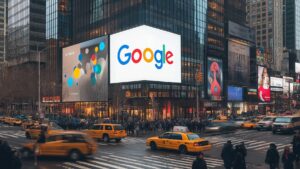AI and SEO are the buzzwords in search engine marketing right now. Artificial intelligence also has an impact on Search engine optimization immense influences. Two different perspectives
- AI supports search engine optimization.
Text creation, Keyword researchSEO audits: AI can support humans in many aspects of optimization. There is a tool for almost everything. - AI is fundamentally changing search engine optimization.
This is because traditional Google, as we knew it in 2024, had already laid the foundations for AI search in 2025 with AI Overviews - and caused a real slump in traffic for many websites.
Perspective #1: Support in SEO work
ChatGPT, Gemini and co. make our everyday lives much easier. But what about SEO? Can we rely on generative AI here too with a clear conscience, or will I lose ranking due to automatically generated content? Let's look at the topic of SEO texts first.
One thing should be said in advance: Google does not penalize AI-generated texts across the board. Google has taken a very clear position on this: AI-generated content is not fundamentally problematic as long as it offers added value. And here we have the crux of the matter: Does content created by artificial intelligence - a system that imitates human cognitive abilities by recognizing and sorting information from input data - offer added value?
The answer is yes and no: AI can answer questions, generate images or even create texts. But it should be treated with caution. It has no real expertise or personal experience, and it is not always the case that the content is correct. As far as SEO content with artificial intelligence is concerned, these texts are particularly problematic if they are published en masse and unedited. The same applies if the AI is used solely for the purpose of generating content to improve the to manipulate search engine rankings. Both violate the Spam guidelines from Google and this can lead to penalties, i.e. penalties imposed by Google employees or automatically, if a Website violates the guidelines. This can mean a loss of ranking, a drop in traffic and restrictions in visibility. Exactly the opposite of what we work for in SEO. In addition, website owners are liable for errors made by the AI in the content.
Perspective #2: Search engines are changing massively due to AI
The world of search engines was turned completely upside down in March 2025. Google introduced the "Overview with AI" - also known as AI Overview - in Germany and other EU countries. For most search queries, information summarized by the AI from the World Wide Web is now displayed first. Similar to what was already known with ChatGPT and Co., AI has been deliberately used here. It is no longer necessary to visit the individual pages in the results - much to the chagrin of website operators, who are currently experiencing a historic slump in traffic figures.
With this extension, Google wants to offer users even faster access to information. The aim is also to answer search queries itself in future. In-depth research should then no longer be necessary. The whole thing will be based on content created by others. Answers will therefore no longer be found, but constructed by the AI, although the aspect of credibility should not be ignored here.
The search behavior of users is changing - and at a rapid pace. Instead of searching for keywords or terms, search queries are increasingly being formulated as specific questions: "How does...?", "What is...?" or "Where can I find...?". With the change in search behavior and the introduction of the AI Overview at Google, the SEO world is also changing. Search engine optimization no longer means that visibility depends on rankings in Google search results, but also on citations in the answers generated by the AI. The AI Overview results usually do not lead to home pages, but rather to thematically relevant and specific subpages. According to Google, personalized and visual search results will also dominate in the future. An SEO strategy that focuses on extensive, detailed and audiovisual content is therefore essential.
The future begins with AI
However, the use of artificial intelligence in search engine optimization is not fundamentally bad, but can also be a real blessing. Because it is the muse of us online marketers. It can help us gather ideas for content, create drafts, outlines and meta tags, support us with keyword research and create images or infographics, saving us real time and introducing completely new aspects. It is always important to remember that AI cannot replace human creativity. Regardless of how AI has provided support, it must always be subject to the critical and scrutinizing eye of a real person. Since Google's Helpful Content update, weak content has had a negative impact on the entire website. As already written, content without real added value is weak content. The primary goal of SEO is to bring the website to the top of the organic search results. This means that the website should be displayed for relevant search queries in order to reach the right target group. We don't do SEO for the search engine, but for the users and our target group.
AI for SEO can provide support in these areas, including practical 💡AI tools for AI SEO (AI SEO tools and AI-supported tools)💡:
1. content
- Content marketing: finding topics and ideas and optimizing content 💡ChatGPT, Gemini, ContentShake AI, Ahref
- Create outline 💡ChatGPT, Gemini, Ahrefs
- Creation of SEO texts 💡ChatGPT, Gemini, Surfer SEO, Jasper, Neuroflash
- Check spelling and grammar💡ChatGPT, Gemini, DeepL Write
- Check for Google standards for relevant texts💡ChatGPT, Gemini
1.1 Visual content
- Creation of images 💡ChatGPT, Gemini, Midjourney, FLUX LORA. Recraft AI, ContentShake AI
- Videos💡Gemini, Synthesia, Canva
- Infographics💡Napkin AI, Infography, Neuroflash
2. one-page optimization
- Revise / write meta tags 💡ChatGPT, Gemini, Ahrefs, Jasper
- Create image alt attributes 💡ChatGPT, Gemini, Ahrefs
- Keyword research💡ChatGPT, Gemini, Surfer SEO, Bramework
3. technical SEO
- Support to fix problems and create structured data 💡ChatGPT,
- Schema markup generation (e.g. snippets, rich results)💡Frase, SEOSurfer, MarketMuse
- Analysis of user behavior for a better user experience (UX) 💡Adobe Sensei, Sketch, DesignScape
- Analysis of website performance💡Google Analytics, Adobe Analytics, Amplitude
- Personalization of search results and content💡trbo, Viual Builder, Brand Kit
- Automation of tasks such as link building and reporting💡SurferSEO BacklinkGPT,
- Optimize local SEO and Google My Business entry 💡Adplorer, Localo AI Agent
The classics such as ChatGPT or Gemini are of course the first port of call, but the specialized tools should not be ignored. Because when it comes to topics such as the search volume of keywords, the two classics reach their limits.
Our tip: Create so-called prompts with ChatGPT or Gems with Gemini and save even more time. For example, you can use them to check the common SEO criteria for a text without having to re-enter the command every time. Simply create a text checker and only have the text checked.
SEO la revolución?
The big fear in the industry is that AI will make SEO superfluous. We can counter this with a very clear no. AI will change the SEO world, but it will by no means make it redundant. The first changes can already be seen at Google, which also displays results from its own AI alongside organic and inorganic results. Online marketers must now adapt their strategies in order to remain visible. But one thing is very important: you can't do without the human mind, even in the online world. The use of AI can make marketing work much easier and take it to a whole new level. New concepts and ideas enrich the work and can create an even better user experience and thus better search engine rankings or enable a citation in the AI Overview.



